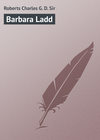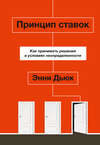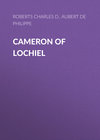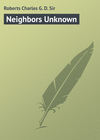Read the book: «Barbara Ladd»
CHAPTER I
She knew very well that she should have started earlier; but if there was one thing that could daunt her wayward and daring little spirit, it was the dark. Now, as she stood, wide-eyed and breathless with suspense, beside her open window, the face of the dark began to change. A gray pallor came over it, and on a sudden she was aware of a black horizon line, ghostly, lonely beyond words, far to the eastward over the yet invisible tree-tops. With this pallor came a chill which Barbara felt on her little, trembling hands, on her eyes, and in her heart: as if the night, in going, had laid aside its benignity and touched the world in farewell with a cold hand of warning and menace. Then, here and there a leaf stood out, palely distinct, upon the thick frondage of the apple-tree whose nearest branches crowded the roof of the porch below her window. There was a faint chirping from the heart of the syringa thicket; and Barbara's ears were so attentive that she caught the drowsy, awakening flutter of small wings down below in the dewy gloom. With the sound came a cool and delicate pungency from the wet currant bushes, puffed upward to her as if the garden world beneath the leaves had drawn a long breath in getting ready to awake. This tonic scent, which nostrils less keen than Barbara's would scarcely have discerned, came to the child as a signal for action. Peculiarly sensitive to the message and influence of odours, she felt this sudden fragrance in her nerves as a summons, a promise, and a challenge, all in one. Noiselessly she pushed the two diamond-paned leaves of her window open to their widest. How the grayness was spreading! A pang of apprehension seized her, lest she had delayed too long. She turned impulsively, and stepped into the darkness of her room.
In a moment her slim little figure reappeared at the window, this time heavily encumbered. In one hand was a round, soft bundle, in the other a square wicker basket with a white cloth tied over the top. The white cloth glimmered conspicuously, but the light was not yet strong enough to reveal the colour of the bundle. Setting both the burdens out upon the roof of the porch, she turned, glanced in at the window, and said, softly:
"Good-bye, little room! I haven't been happy with you. But I hope you won't be lonely when I'm gone!"
Leaning over the edge of the porch, she dropped the bundle soundlessly into a bed of marigolds. The basket, on the other hand, she took up with care. Thrusting her left arm through the handle, she swung herself nimbly into the apple-tree, and thence to the ground; while the basket tipped and slewed as if it were alive.
"Be still, my babies!" she whispered; and then, picking up the bundle from the crushed marigolds, and never turning her head to look up at the stately old house which she was leaving, she fled down the walk between the currant and gooseberry bushes, the thyme, the sage, and summer savoury beds, – through a narrow wicket gate half-hidden in larkspur and honeysuckle, – along the foot-path through the rank and dripping burdocks back of the barn, where she felt a little qualm of homesickness at the sound of her dear horses breathing deeply and contentedly in the stalls, – and thence, letting down one of the bars and crawling through with her burdens, out into the graying, hillocky open of the cow-pasture.
By this time a cool and luminous wave of pink, changing to pale saffron at its northeastern edges, had crept up over the far-off hilltops. Faint tinges of colour, of a strange and unusual transparency, began to reveal themselves all over the expanse of pasture. As the miracle of dawn thus overtook her, a sense of unreality came upon Barbara's soul. She felt as if this were not she, this little girl so adventurously running away – but rather some impossible child in a story-book, who had so engaged her sympathies for the moment that she could not be sure which was make-believe and which herself. With a chill of lonesome dread she slipped a hand under the cloth and into the basket. The touch of warm, live, cuddling fur reassured her, and brought her back to her own identity. But stranger and stranger grew the mystical transparency, only made the more startling by a fleece of vapour here and there curling up from between the hillocks. Stumps, weed-tops, patches of juniper, tufts of blueberry bush, wisps of coarse grass left uncropped, seemed to detach themselves, lift, and float in the solvent clarity of that new-born air, that new-born light. Surely, this was not her old, familiar world! Barbara stood still, her great eyes dilating, her lips parted in a kind of ecstasy, as sense and spirit alike drank in the marvel of the dawn. It seemed to her as if she discovered, in that moment, that the world was made anew with every morning, – and with the discovery she became aware, dimly but securely, that she was herself a part of the imperishable, ever-renewing life.
She was brought back to more instant considerations by the sudden appearance of a red-and-white cow, which got up with a great, windy, grunting breath, and came toward her out of a misty hollow. With all the cows of the herd Barbara was in high favour, but just now the sight alarmed her.
"Gracious!" she exclaimed to herself, "Abby will be out to milk in another minute!" – and she broke into a run at the best speed that her burdens would permit, making for the maple woods which lay to the north of the pasture. The cow looked and mooed after her wistfully, wondering at her flight, and aching for the relief of the milker's hand. But Barbara paid no heed to her, nor to the others of the herd, who now came into view from corners of the pasture as the enchanted light grew and spread. She darted on, vanishing in the hollows, flitting over the hillocks, fleetly threading the crooked and slender path, – a wisp-like, dark little figure. Her bundle, now seen to be tied up in a silk shawl of flamelike scarlet, and the snow-white covering of her basket, flickered across the mystical transparency of the landscape like bubbles of intense light blown far in advance of the morning.
Not till she came to the other side of the pasture and plunged into the obscurity of the woods did Barbara check her speed. Here the dawn was but beginning to penetrate, thrusting thin shafts of pink-amber light here and there through the leafage, and touching the eastward sides of trunk and branch with elusive glories. Breathing quickly, Barbara set down the bundle and the precious basket; but she snatched them up again as she caught a sound of panting and running behind her. On the instant, however, the alarm faded from her face.
"Down, Keep!" she commanded, sharply, as the gaunt gray form of a mastiff leaped upon her, almost carrying her off her feet. Fawning, and giving little yelps of joy, the huge animal crouched before her, pounding the sward with ecstatic tail, and implored to lick her hands. She threw both arms about the dog's head, murmuring to him, poignantly impetuous, her voice tearful with self-reproach:
"Was his best friend going away, without ever saying good-bye to him? Well, she was bad, she was very, very bad!" And she wiped away several large, surreptitious tears upon the furry folds of his neck. Then she sprang up and renewed her journey resolutely; while the mastiff, bounding in front of her, showed his plain conviction that some fine, audacious adventure was afoot, and that it would be his great luck to have a part in it.
For more than a mile Barbara followed the wood-path, the fresh, wet gloom lightening about her as she went. Where the maples thinned away, and the slenderer ash and birch took their place, she got glimpses of a pale sky overhead, dappled with streamers of a fiery violet. Here and there a dripping leaf had caught the colours from above and flashed elusive jewels upon her vision. Here and there the dewy thickets of witch-hazel and viburnum crowded so close about the path that her skirts and shoulders were drenched with their scented largess. Here and there in her path rose suddenly a cluster of night-born toadstools – squat, yellow, and fat-fleshed, or tall, shadowy-hooded, and whitely venomous – over which she stepped with wary aversion. And once, eager as was her haste, she stopped to pick a great, lucent, yellow orchid, which seemed to beam like a sacred lamp in its dark green shrine beneath the alders.
At length the path dipped sharply between rocks overgrown with poison ivy. Then the trees thinned away before her, and the day grew at once full of light; and the mirror-surface of a little lake, shining with palest crocus-tint and violet and silvery rose, obscured with patches of dissolving mist, flashed upon her eyes. She ran down to the very edge, where the water seemed to breathe among its fringing pebbles, and there set down the bundle and the basket; while the dog, yelping joyously, bounded and splashed in the shallows.
When, however, Barbara stepped up the bank to a thicket of Indian willow, and proceeded, by dint of carefully calculated lifting and pulling, to drag forth from its hiding-place a ruddy canoe of birch-bark, the dog's spirits and his flaunting tail fell together. If Barbara's venture was to be in the canoe, he knew he should have no part in it; and his big, doggish heart was dejected. With his tongue hanging from his jaws, he sat up on his brindled haunches and looked on, while slowly and laboriously Barbara worked the frail craft down to the water. When it was afloat, and the resined prow pulled up into a tuft of weeds to keep it from drifting away, Barbara fetched two paddles from the same hiding-place. In the bow of the canoe she stowed her bundle and her basket. In the stern she arranged a pile of ferns as a cushion for her knees. Once more she flung her arms around Keep's massive neck, kissed his silky ears, wept violently for the smallest fraction of a minute; and then, stepping into the canoe with the light precision of one skilled with the birch-bark, she pushed off, and with quick, vigorous strokes headed straight across the lake. The dog ran uneasily up and down the water's edge, whining and fretting after her. When she was a little way out he made a sudden resolution, plunged into the water, and swam eagerly after the fugitive. But Barbara heard the splash, and understood. She realised that he would surely upset the canoe in trying to get into it, and this was the time when she must seem hard, however her heart was melting. She looked back over her shoulder.
"Go home, Keep! Go home!" she commanded.
The dog turned obediently and made for shore. And Barbara, her lips set and the big tears rolling down her cheeks, continued her journey out across the lake.
CHAPTER II
It was now clear day. The ample spaces of blue between the thin clouds overhead grew pure, as if new bathed. The sun was not yet visible over the woods, but sent level shafts of radiance through the sparser leafage. Barbara's face was westward, and her prow, as the nervous cunning of her paddle urged it forward, threw off the water on either side in long, polished, fluted furrows, dazzlingly bright at the top of the curve and steel-dark in the depression. Child as she was, and of a fairy slightness, Barbara's wrists were strong and she was master of her paddle. Her tears presently dried themselves as she noted with exultation, by the growing depth and abruptness of these furrows from her prow, that she was making a speed that did credit to her canoe-craft. In a few minutes her parting pangs were all forgotten, and she was absorbed in racing, as it were, against herself. She knelt low, working her shoulders freely like a squaw, and bent every energy to making the passage of the open before a wind out of the morning should awake to hinder her progress.
A low, green point, deep-plumed with sedge, thrust out from the nearing shore to meet her. At its tip, motionless, and eloquent of ancient mystery, poised the dream-like shape of a blue heron. Nearer and nearer slipped the canoe, till Barbara could discern the round, unwinking jewel of the great bird's eye, watching her inscrutably. Then, with leisurely spread of spacious wings, it rose and flapped away, to renew its not wholly disinterested contemplations in a further reed-bed.
Behind the point of sedges Barbara swept the canoe on a fine curve, and into the channel of a little river, the quiet outlet of the lake. Alders, osiers, and thick-starred draperies of clematis came down over either bank. The stream was not twenty paces wide, and its deep current was so gentle that the long weeds on the bottom were hardly under compulsion to show which way it flowed.
The ancient wood at this place gave back several hundred yards from the lake, save for scattered outposts and thickets. Rounding the first curve of the stream, – which, indeed, seemed all curves in its reluctance to forsake the parent water, – the canoe ran into a flock of gray-and-white geese dabbling along the weedy margin. The birds were not alarmed, but they lifted their heads and clamoured a sonorous warning; and straightway from behind the screen of leafage came a quacking of ducks, a cackling of hens, and the excited barking of a puppy. Then a cock crowed shrilly. The stream rounded to a wider stretch, and its western bank, flooded with sunshine, showed a grassy clearing of perhaps two acres in extent, at the back of which, close against the primeval trees, huddled a low, gray cabin, with wide eaves and a red door. A hop-vine covered one end of the cabin and sprawled over the roof. Along the base ran a "banking" about two feet high, of rough boards with the bark on, supported by stakes and filled in with earth – a protection to the cellar against winter frosts. Leaned up to the sun, along the banking, stood wooden tubs and an iron pot; and on a bench beside the door another tub. In front of the door was a space of chips, littered with axe, buck-saw, feed-troughs, parts of a broken hand-sled, a large wicker basket with the bottom gone, and indeterminate waifs and strays of human use. From this space of débris a foot-path ran down through short grass to the waterside, where a clumsy punt was hauled up. The place was alive with ducks and chickens; and as Barbara came in view a stately turkey-cock swelled, strutted, and gobbled defiance to her intrusion.
Sitting on the door-step in the sun was a sturdy old woman in greenish homespun petticoat and bodice, with a dull red kerchief crossed upon her shoulders and a cap of greenish-yellow linen on her head, – the soft dye of the "yaller-weed" juice. She was busy cutting coloured rags into strips for mat-hooking. At her side sat a small yellow puppy, with head cocked and one ear alertly lifted, curious but doubtful as to the visitor.
Barbara turned her birchen prow to the landing-place, and ran it gently ashore in the soft mud beside the punt. At the same moment Mrs. Deborah Blue – known to Barbara and to all the village of Second Westings as 'old Debby' – dropped her knitting on the stoop, snatched up a stout stick that leaned against the door-post, and hobbled with a heavy briskness down the path to meet the visitor. The yellow pup frisked interestedly at her heels.
Barbara had indeed run her prow ashore, but that was for the sake of stability merely. She was in haste, and had no idea of stopping now to indulge her inclination for a gossip with old Debby. She rested in silence, one brown hand on the gunwale of the punt, her full, young, wilful lips very scarlet, her gray-green eyes asparkle with mystery and excitement, as the old woman hobbled down to greet her.
"Ain't ye comin' in to set awhile, an' eat a cooky, Miss Barby?" inquired Mrs. Blue, wondering at the child's inscrutable look. The old dame's face was red and harsh and strongly lined. Her chin was square and thrust forward aggressively, with a gray-bristled wart at one side of its obtrusive vigour. A lean and iron-gray wisp of hair, escaped from under her hat, straggled down upon her red neck. But her shrewd, hard, pale-blue, dauntless old eyes beamed upon the child with unfeigned welcome. She spoke a little wheezingly, being out of breath from haste; and Barbara was the only soul in all the township of Second Westings for whom old Debby would condescend to hasten.
"No, Debby dear, I can't stop one minute. I'm not coming ashore. I'm running away from Aunt Hitty, and I'm going down the river to Uncle Bob. I just stopped to say good-bye to you, you old dear, and to ask you to take this letter for me to Aunt Hitty. I didn't dare to leave it in my room, for fear she'd find it and know where I'd gone, and send after me before I'd got a good start. I don't like Aunt Hitty, you know, Debby, but she's been good to me in her way, and I don't want her to be worrying!" She held out a folded paper for the old dame to take; but she held it tentatively, as if she did not want to surrender it at once.
Knowing Barbara as no one else in the township of Second Westings knew her, old Debby betrayed neither surprise nor disapproval. She nodded several times, as if running away were the most reasonable, and indeed the most ordinary, thing in the world for a little girl of fourteen years to do when she found aunts and environments uncongenial. Old Debby's smile, at this moment, had just the right degree of sympathy. Had ever so little of amusement glimmered through its weather-beaten creases, she knew that the sensitive and wilful girl before her would have been off in a second with her venture all unexplained.
"I'd take it fer ye, my sweeting, ef I'd got to crawl on my knees all the way 'round the lake," the old dame answered promptly; but at the same time, scheming to prolong the interview, and knowing that if once Barbara started off again there would be no such thing as luring her back, she kept both hands clasped on top of her stick and made no move to accept the missive.
"Ain't ye goin' to read it to me?" she went on, coaxingly. "I'd give a sight to hear what ye're sayin' to yer Aunt Hitty."
Now this was just what Barbara wanted, in spite of her haste. She wanted to hear how her letter would sound. She wanted to try it on old Debby, in whom she felt sure of a eulogistic critic. Without a word she untied the yellow ribbon, opened the packet, and began to read, with a weighty impressiveness in her childish voice:
"MY DEAR AUNT HITTY: – This is to say farewell for ever, for I have run away. I do not think it would be good for me to live with you any longer, so I am going to Uncle Bob. He loves me, and does not think I am bad. And I think he needs me, too, because I understand him. I know I have often been bad, and have made you unhappy very often, Aunt Hitty. But I don't think you ever understand me – and I don't understand you – and so we cannot be happy together. But don't be worried about me, for I will be all right. And I thank you for all the trouble you have taken about me. I don't want any of my old clothes except what I have brought with me, so please give them to Mercy Chapman, because she is poor and just about my size, and always kind to animals, and I like her. I have taken your nice basket you got from the squaw last Saturday, to carry my kittens in; but I know you won't mind, because you offered to give it to me when I did not know I was going to need it. I have taken the canoe, too, but I want to pay for it, of course, Aunt Hitty. Please keep enough to get a new one, and paddles, out of the money you are taking care of for me, and send the rest right away to Uncle Bob, because I'll need some new frocks when I get to the city, and I don't know whether Uncle Bob has any money or not. Good-bye, Aunt Hitty, and I am so sorry that we could not understand each other.
"Your niece,
"BARBARA LADD."
She looked up, proud, but a little anxious, and eager for commendation. Old Debby rose to the circumstances.
"Law, how you kin write, Miss Barby," she said, with a nod and chuckle. "The parson nor Doctor Jim couldn't 'a' done no better. I reckon Aunt Hitty'll understand ye now, a sight better'n she's given to understand folks as don't jest think as she do. Give me the letter!"
Barbara's face flashed radiantly. With a sudden impulse she sprang up, skipped ashore, thrust the letter into the old woman's hand, and cried in a high key:
"Oh, I'm so hungry, Debby! I can't stop a minute, but do give me some breakfast, there's a dear. I was too excited to eat before I left. And do give my kittens a drop of milk. I've got nothing but cold meat for them to eat on the journey, poor babies!"
Without waiting for a reply, she skipped back to the canoe, grabbed up the covered basket, and flew up the path to the cottage; while the old woman limped after her with astonishing speed, chuckling and wheezing out a disjointed invitation. She followed Barbara into the cabin, shutting the door to keep out the puppy, who whined in an injured voice upon the stoop. Then, thinking of the kittens first, – and thereby showing her deep knowledge of the kittens' mistress, – she set down a bowl of milk in the middle of the floor; and Barbara, uncovering the basket, lovingly lifted out three plump, moon-faced little cats, a yellow-and-white, a black-and-white, and a gray-and-white. While the three, with happy tails erect, lapped at the milk, Barbara made haste to devour thick slices of brown bread and butter, spread to a luscious depth with moist, sweet-scented maple sugar. She had no time to talk. She sat on the edge of the big four-post bed, swinging her slim legs, and kicking her heels against the dingy, gay patchwork quilt whose ample folds hung to the floor. The hidden space under the bed was a place of piquant mystery to Barbara, containing, as it did, boxes on boxes of many-coloured rags, out of which, earlier in the season, old Debby would bring forth precious goose-eggs, duck-eggs, turkey-eggs, and the specially prized eggs of certain pet and prolific hens, gathered against the time of setting. While Barbara broke her fast, old Debby refrained from questions, having shrewdly grasped the whole situation. She knew that Mr. Robert Glenowen, Barbara's uncle, had lately come north on an errand which nobody seemed to understand, and had taken a house at Stratford. Of a nomadic spirit in her younger days, Debby had moved much here and there throughout her native Connecticut, and over the bordering counties of New York and Massachusetts; and she had not only a rough idea of the distance from Second Westings to Stratford, but a very vivid realisation of the perils of the journey which Barbara, in her innocence, had so confidently undertaken. Till she saw that the appetites of Barbara and the kittens were nearing satisfaction, she talked with a sort of casual enthusiasm of her luck with the chickens, the goslings, the young turkeys, and depicted the prowess of an old speckled hen which had engaged and defeated a marauding hawk. Then, when at last Barbara sprang up, bundled the satiated kittens into the basket, and turned to her for a fond and final good-bye, the crafty old dame broke into passionate farewells. She kissed the child, and even wept over her, till Barbara's self-centred exaltation was very near collapse.
"You love me, don't you, Debby dear?" she exclaimed, with a wistfulness in her voice, searching the old woman's face with her great, eager, strangely alien eyes. Barbara was one of those who colour the moods of others by their own, and who are therefore apt to be at fault in their interpretation of another's motives. This gave her, even in childhood, a strangeness, an aloneness of personality, which she, as well as those who loved her, could seldom break down. It was with a kind of heart-break that she now and again, for an instant, became dimly aware of this alien fibre in her temperament. It made her both misunderstanding and misunderstood.
"I can trust you, can't I?" she went on, leaning childishly for a moment upon the old woman's comfortable breast.
"Trust old Debby, my sweeting!" cried the old dame, in tones which carried conviction. "Ye hain't got no lovinger nor faithfuller friend alive than me. Don't ye never forgit that, Miss Barby."
For answer Barbara clutched her fiercely around the neck, sobbed and clung to her for a moment, cried extravagantly, "Yes, you are the best friend I've got in all the world!" then gathered up her basket of kittens and fled wildly down the path to the canoe. Impetuously she pushed off, the world a golden blur before her eyes; and without once looking back, she disappeared around the next winding of the stream. Old Debby stood for some minutes gazing after this meteor-like – and very Barbara-like – exit. There was amusement now, unhindered, on her hard old face, but a kind of fierce devotion withal. When the stern of the canoe had vanished behind the leafage, she muttered to herself: "Well! Well! Well! was ever sech a child! When ye set yer finger onto her, she ain't there! I reckon that mincing-mouthed Aunt Kitty's hed her bad times, too. But the sooner I git 'round to see Doctor Jim the better it's goin' to be fer the little wild witch. Land's sakes alive! But 'twon't be 'Debby dear' to me agin fer awhile. How them eyes'll blaze! I'll not go nigh her till she's hed time to git over it an' to know who's really her friends. No, Pippin, ye can't come with me! Go 'way!"
Turning into the long lean-to of a shed which stretched behind the cabin, she brought out two stumpy oars. These under her left arm, her stalwart stick in her right hand, she limped with massive alertness down to the waterside, shoved off the punt, climbed into it with a nicety of balance remarkable in one of her weight, clicked the oars into the rowlocks, and pulled up-stream toward the lake whence Barbara had come.



















